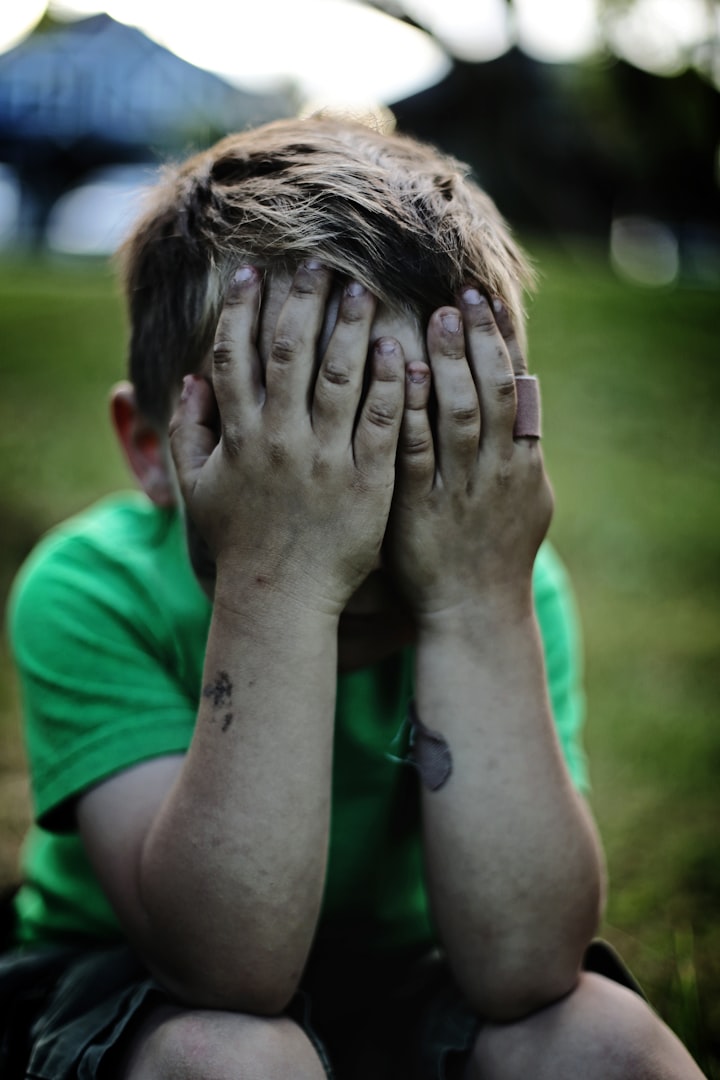Not All Depression Is The Same
The Treatment Shouldn't Be, Either

Depression: when you have it, you know it. Common symptoms: sadness, lethargy, lack of motivation, overeating, undereating, anhedonia (lack of pleasure in doing things), insomnia, oversleeping, "grey-ness", etc.
The most persistent and most troublesome symptom of depression however, seems to be the sense of hopelessness and powerlessness that accompany it. Depression usually occurs when there is a situation in our lives that we don't want, combined with the fact that we feel powerless to change it.
With that being said, not all depression is the same. There are various factors that contribute to depressive states. And there are various treatments for depression, based on the contributing factors.
As a mental health professional, I feel frustrated that we live in a culture that sells medication as the standard, go-t0 "cure". If we're lucky, we find a healthcare provider that recommends both medication and counseling together to treat symptoms of depression. And while I believe that medication can definitely be an effective part of the solution, it is by no means the only solution.
And, in our current economic situation, sometimes people don't have access to insurance or healthcare that makes counseling affordable. This is part of why I write as I do - to provide information for those who are looking for help and may need free resources for a time.
With that being said, this article is not to be taken as medical advice. Please consult with your primary care physician, or your own mental health professional before adopting any new protocols or changes in your current treatment.
So, with that legal disclaimer out of the way, I think it's a necessity for those who are struggling with depression to understand more about the root cause of their depression, and to have some alternatives for treatment, instead of just blanketing all depression with medications or a one-size-fits-all approach. Without further ado, here we go.
SOME COMMON FACTORS THAT CONTRIBUTE TO DEPRESSION

1. GENETIC PREDISPOSITION
I address this one first, because this one gets a lot of attention, and this is the current culturally accepted paradigm about depression. We assume that there is a biological cause, and that we are somewhat "doomed" to have depression based on our genes.
Studies do show that approximately 40% of those who struggle with depression have a genetic component to the problem. And for those that have this genetic component, SSRI medications (like Prozac, Paxil, Zoloft, etc) can be helpful in the treatment of depression.
But not everyone responds to this treatment, and those who do, often have to try several before finding the right one that works for them. Researchers were curious as to why some responded to this treatment and some did not. What researchers found was that those with a polymorphism that causes short SERT (serotonin transporter) alleles and altered 5-HT receptors have decreased levels of a serotonin transporter and are more susceptible to anxiety and depression when stressful events occur. For people with this genetic predisposition, SSRIs seem to be an effective treatment for depression and anxiety.
The problem with the argument that people are biologically wired to be more prone to depression, however is that it can engender feelings of hopelessness to ever overcome it. People can fall victim to the belief that because they have "bad genes", they are stuck with depression for their whole lives.
The good new is this: genes are NOT destiny. Recent research into epigenetics has shown that we can have very powerful influence on whether or not a gene will be expressed, and thus cause symptoms, through our actions and through controlling our environments.
For example, children who have increased incidences of trauma or adverse experiences in childhood show increased methylation of some genes, which could predisposition them for depression - even though they didn't have the short 5-HT allele in the first place. The genetic marker was not there - but environment caused a change at the genetic level.
On the other hand, making positive changes in our environment can have the reverse effect. Enhancing and altering our environments for the better can turn off the effects of genes that might otherwise increase depressive symptoms. Recent clinical studies in mice show that high fat diets (including healthy fats, not trans fats) are effective in mediating the problems caused by the SERT polymorphism - decreasing the effects of depression. In this way, the ketogenic diet is an interesting area of exploration for relieving symptoms in humans. It may be worth exploring for yourself.
And incorporating both medication and epigenetics, in mouse models, the SSRI escitalopram was shown to not only ameliorate depressive symptoms, but induce the epigenetic reversal of the methylation process that caused the depression in the first place.
Epigenetics is a relatively new and growing field in science. But what it offers is hope that we are not bound by fate or destiny with the adverse outcomes that we may be genetically disposed to. We have control over factors in our environments - both external and internal. When we change components of these environments, we have the ability to change how our genes express and the outcomes that happen - such as depression.
For more information on epigenetics and a crash course that's easy enough for most beginners to dive into, I highly recommend the book The Biology of Belief by Bruce Lipton.
2. PAST TRAUMATIC EXPERIENCES

As mentioned above, past traumatic experiences can affect us on a biological level, which could predispose us for depressive symptoms in relation to stressful stimuli.
However, our memories of those traumatic events also pre-frame our current world view and current thoughts in such a way that lead us down paths of thought in our current experience that contribute to experiences of depressive symptoms in our current situation.
Taken together, most people who have adverse experiences - especially during childhood - tend to have a multitude of negative outcomes later in life - including depression. If you haven't heard about the ACES research, this article may be enlightening.
To address this cause of depression, it can be beneficial to do trauma-informed therapy with a licensed mental health professional. Look for one that practices EMDR, somatic experiencing, or polyvagal theory. To find an EMDR practitioner near you, go to PsychologyToday, and search "EMDR _____________", fill your city name in the blank.
Also of note, mindful movement such as yoga, tai chi, and dancing can be beneficial in assisting our bodies to release the stored energy of trauma, and thus help in alleviating depression.
And if you're interested in beginning a path of self healing for trauma, I recommend these books: The Body Keeps The Score by Bessel Van Der Kolk , Waking The Tiger, Healing Trauma, by Peter Levine, and The Pocket Guide to Polyvagal Theory, by Stephen Porges.
3. LEARNED HELPLESSNESS

For some who are depressed, they may have experienced enough life situations where things have not gone their way, despite any efforts they took to change things. In this case, a pattern of past experiences validate the belief that nothing that one does will have any effect on better outcomes, and these people tend to give up hope and stop pursuing any efforts for healing.
Martin Seligman did some intriguing preliminary research with dogs that illustrates this principle well. The thing is, humans do the same thing. When we learn through repeated experience that our actions don't have any bearing on the outcomes, we give up trying.
A way to start healing in this case is to slowly work on creating small experiments that foster self-efficacy - a belief that your efforts produce successful outcomes. This can be as simple as starting with mindfully having checklists for each day of things to get done. And when something gets done, crossing it off (visual cue), and celebrating in some way (bodily cue).
Once we've mastered the fact that we can have self-efficacy with small things like taking out the trash, going to the grocery store, cleaning out our email inboxes, etc, we can upgrade to more challenging or complex things. The key here is that we're building new tangible memoires for our brains to return to when we have feelings that we're not effective or have no power. We will now have new memories to draw on which prove otherwise.
Another great resource, is Martin Seligman's work on happiness and learned optimism, the counterbalance to learned helplessness. I have found his book, Flourish to be a great practical guide with exercises that show tangible results relatively quickly.
4. SECONDARY GAINS

This one is more of a reason that depression persists, than an actual cause of depression. I see it often co-occurring with instances of past trauma and diagnoses of C-PTSD and borderline personality disorder.
In this case, there is usually some kind of psychological payoff for a person to remain in a depressed state. For example, sometimes people get more attention if they are unwell than if they are well. For some, their identity is made by being a victim of a mental illness, physical illness, or other catastrophic event. To take away the depression would take away their identity. For others, it can be that if they are no longer depressed, they have to live up to impossible expectations, either self-imposed, or from others.
As a clinician, I start looking for this indicator when a person says they want to get better, but then continues to engage in behaviors that tell otherwise. If so, I am fairly certain that the person is getting some kind of secondary gain, or psychological payoff for remaining unwell.
The treatment in this case would be exploring secondary gains, payoffs the person might be getting, and competing needs. Often times a simple journaling exercise, asking questions about those competing needs can highlight where a person is caught between two opposing drives. Once those competing needs are identified, a person can usually work together with a licensed mental health professional to find more adaptive ways of meeting those secondary needs.
5. DEATH/ LOSS / GRIEVING

This one seems like it would be straightforward, but I am surprised at how many people come to talk with me, and their primary complaint is depression. Yet, when I ask them about recent activating events, they will mention a loss of some kind : a loved one dying, a break up or divorce, a loss of a job, a recent illness, etc. And it doesn't seem to cross their minds that depression is a common - and natural - response to this disruption in life.
Yet, if we look at the main symptom of depression as hopelessness or powerlessness to change a certain situation, grief is the ultimate representation of this. Often times we are powerless to change the situation. We can't bring the loved one back. We can't decide if someone will leave us or cheat on us. We can't undo a company deciding to downsize leading to job loss. We can't undo the cancer diagnosis. These are things that we legitimately are powerless to change.
And it is normal for a period of depression to follow these periods of change. Our bodies and psyches need time to adjust to the new reality and to make sense of the way our world now shows up. It is normal to feel hopeless and frustrated and lost during these times.
In these cases, seek support. Whether you decide to go see a counselor for someone to talk to, join a grief support group, get involved in community service, or go for stitch-and-bitch sessions with a trusted friend, the mode of support doesn't matter. Connection in times of grieving that is truly supportive can be a great boon in times of transition.
6. BEING A TEENAGER

Teens often struggle with anxiety and depression through puberty and adolescence.
This is a normal part of development, but in a world fueled by social media, filters, and highlight reels, teens who have now known nothing other than the digital age are often left comparing themselves to others they see online. They don't have the contrast that previous generations did of life without this constant barrage of images, dopamine spikes, and instant gratification.
It is normal to have a part of our brains that chatter like shame gremlins, as Brene Brown calls them. The part of our brain that tells us we're not good enough, or worthy enough, or pretty enough, or smart enough. This is exacerbated by a steady stream of seeming perfection that is the constant companion of many teens who engage with social media.
During this time, their bodies are also going through tremendous amounts of change, and tremendous shifts in sex hormones. The loss of childhood can be a disenfranchised grief - one that society doesn't see or recognize. It can be hard to define, let alone recognize. In addition, the rapid changes can leave teens feeling uncomfortable, off balance, and awkward at a time when their social circles are increasing and their peers become more of a social factor than their families. This can lead to feelings of inadequacy and embarrassment, and often times our teens don't have the guidance to learn how to navigate this complex hormonal and emotional stew. This can lead to feelings of isolation and loneliness on top of the already present discomfort.
It's not uncommon for teens to have their first experiences of suicidal thoughts at this time. Most humans will have at least one point in their life where they contemplate death as an option. When it happens in the teen years, it can be particularly challenging, due to the aforementioned factors.
Some of the best things to do for teens who may be experiencing depression are the following. First, get them counseling or therapy. Sometimes having someone to talk to besides mom or dad can be therapeutic. Second, provide opportunities for achievement. This doesn't mean that we need to give them trophies for everything they do. But having something such as a sport they play, an instrument they learn, a subject they excel in, or a job they enjoy and can master can go a long way toward increasing feelings of self-efficacy. Feelings of self-efficacy and pride in accomplishment can go a long way toward alleviating feelings of awkwardness that arise as they are learning to navigate their new bodies and experiences.
7. EXISTENTIAL ANGST

This can be one of the hardest things to describe to someone who has not experienced it. It is typically classified as a deep need to understand the mysteries of life. Why am I here? Is there a meaning to life? How do I make sense of the world around me? I'm terrified that at the end of the day, I have ultimate freedom to choose: there's no guidebook for life. These, and many other similar thoughts plague the mind of someone going through an existential crisis, or experiencing existential angst.
I went though this as I transitioned out of organized religion. The worldview I once believed in was suddenly gone, and there was nothing left in its place. All of a sudden, it was up to me to define deeper beliefs about the meaning of existence, and the thrown-ness, as the existentialists call it, that I found myself in.
It's not uncommon for people who reach middle adulthood to experience similar thoughts and crises. At this point, we begin to recognize the finiteness of our mortality. We may be experiencing a new phase of life as children leave the home, and we now have room to expand beyond roles we filled as mothers and fathers.
It's also not uncommon for those who experience a significant loss to begin questioning the nature of existence and reality as well.
And for those that find themselves in the midst of such questions, the minutia of daily living and tedium of daily routines can seem banal and pointless. It can be difficult to engage in activities that we used to find pleasurable that now hold little to no meaning. It can be challenging to engage with friends, loved ones, coworkers, and clients that are not experiencing the same depth of questioning and challenging existence.
This one can be one of the most difficult to shift, because it doesn't typically respond to antidepressants.
Mindful movement, such as yoga and walking can help, because it can stimulate new and creative thought connections, which may lead to insight and answers to the deeper questions.
Talking with others who can approach the philosophical can also help ease the loneliness that often accompanies this phase.
And lastly, this website helped me when I was going through my phase of intense exploration and depression. It may have some helpful suggestions for you.
8. SEASONAL SHIFTS (SEASONAL AFFECTIVE DISORDER)

It's not uncommon to experience a sense of depression with the change of seasons, particularly with the change from summer to autumn, and then into winter.
During these seasons, we experience less direct sunlight due to shorter days and greater number of days with cloud cover.
Our bodies need sunlight for the regulation of our circadian rhythms, and also for vitamin D. Without these, we may experience shifts in hormones, natural body cycles, and in increase in depressive symptoms.
To combat this, it may be beneficial to supplement with vitamin D supplements. Or, if you're not averse to the cold weather, get outside as often as weather permits to still get some sunlight, even filtered through an overcast sky.
Two other options that I have found to be beneficial during this time of year are different forms of light therapy.
Red light therapy is beneficial for regulating patterns for sleep, and for increasing levels of energy and mitochondrial function. This can help fight the sense of lethargy that accompanies this time of year. This is the model I use that I've found to be effective, and in an affordable price range.
Natural light therapy has also proven to be clinically effective for those who experience depression due to the seasonal shift. It can simulate exposure to natural light effectively and help our bodies get back into a more normal rhythm and start synthesizing the Vitamin D we'd get from natural sunlight. These used to be quite expensive, but the cost has come down significantly to be much more affordable for many.
9. POOR NUTRITION

I personally find it kind of telling that the acronym for our typical diet here in America is SAD - the Standard American Diet. The foods we typically eat are linked to depression in at least two ways.
Firstly, eating highly processed foods full of sugars and shelf-stable fats contribute to obesity, heart disease, and depression. They're easy to grab in our time crunched schedules. And they're what our bodies crave when we're low on sleep and serotonin, because serotonin makes us feel better, and sugar gives us temporary energy. But the science is becoming more abundantly clear. Both sugar and trans fats are linked to depression. Try eliminating them for 10 days and see if your symptoms improve.
Secondly, the micronutrients and phytonutrients we need to boost mood and enhance hormone and neurotransmitter function are found in things like leafy greens, colored vegetables, and high quality protein sources, like grass fed and organic beef and chicken, and wild caught fish like salmon.
However, even if we're intentional about consuming diets full of whole foods, our soil is currently depleted by mass farming processes, so sometimes, even with all the fruits and veggies we eat, we're still nutrient deficient. It may still serve to supplement with vitamins. If you're wanting a list of ones that are beneficial for depression, check out my other article , 12 Ways to Fight Depression That Aren't Medication. Another great resource is The Doctor's Pharmacy podcast, and Dr. Mark Hyman's book, The Ultra Mind Solution.
CONCLUSION
Ultimately, depression is a multifaceted cluster of symptoms. I even hesitate to call it a disease, because often times it is a result of situational and environmental factors. Understanding those factors can help you find the right treatment for you.
I hope you found this guide helpful. Please share it with someone who might need it. And if you feel so inspired, tips are greatly appreciated as an energetic exchange.
If you prefer video content to the written word, follow me on instagram : @selfcenteredhealing.
Several links in this article are affiliate links, for which I may receive a small commission at no cost to you. This helps me keep the free content coming.
About the Creator
Shana Galbraith
Professional counselor, spiritual seeker. The human spirit is indomitable, and people are fascinating. I write about mental health and personal development.
Instagram: @selfcenteredhealing






Comments
There are no comments for this story
Be the first to respond and start the conversation.